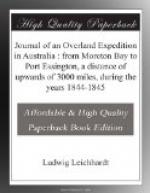The wood-duck (Bernicla jubata) abounded on the larger water-holes which we passed; and the swamp-pheasant (Centropus Phasianus, Gould) was heard several times among the trees surrounding the grassy hollows.
The smoke of extensive bush-fires was observed under Lord’s Table Range, and along the western and south-western ranges. As we approached the place of our encampment of the 12th February, some Blackfellows were bathing in the water-hole, but fled as soon as we made our appearance.
The night of the 8th February was cloudy, with a little rain, which continued to the morning of the 9th, but cleared up at noon, and the weather became very hot. During the afternoon, thunder-storms passed to the north and north-west, and also to the east and east-south-east. On the 10th, thunder-storms again surrounded us on all sides, and from one, which broke over us in the night, a heavy shower fell. The night of the 11th was exceedingly cold; and the night breeze was observed to be less regular than formerly.
We were here very much troubled with a small black ant; infesting our provisions during the day and running over our persons, and biting us severely at night. A large yellow hornet with two black bands over the abdomen, was seen, humming about the water-holes. A crow was shot and roasted, and found to be exceedingly tender, which we considered to be a great discovery; and lost no opportunity of shooting as many as we could, in order to lessen the consumption of our dried meat. We again enjoyed some fine messes of Portulaca.
Feb. 12.—I went, accompanied by Mr. Roper and Charley, in a due north direction to reconnoitre the country. The flat continued for about eight miles, and then changed into slight undulations. Considerable tracts were covered with the Poplar-gum; and broad belts of Bricklow descended from the hills towards the east. In the scrub; Fusanus was observed in fruit, and the Stenochilus and the white Vitex in blossom; from the latter the native bee extracts a most delicious honey. A small tree, with stiff alternate leaves scarcely an inch long, was covered with red fruit of the form of an acorn, and about half an inch long, having a sweet pericarp with two compressed grain-like seeds, which had the horny albumen of the coffee, and were exceedingly bitter. The pigeons, crows, and cockatoos, fed upon them, we also ate a great number of them; but the edible portion of each seed was very small. It is a remarkable fact that trees, which we had found in full blossom or in fruit in October and November, were again observed to be in blossom and fruit in February.
We had to encamp at night without water; and although the clouds gathered in the afternoon of a very hot day, yet no thunder-storm came to our relief. The night breeze, which was in all probability the sea-breeze, set in about ten minutes to six.




